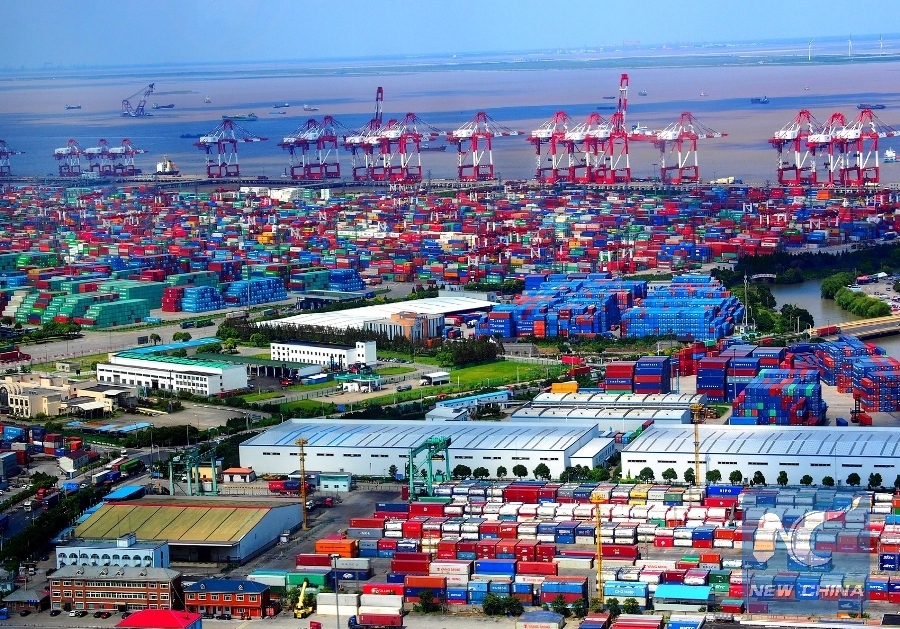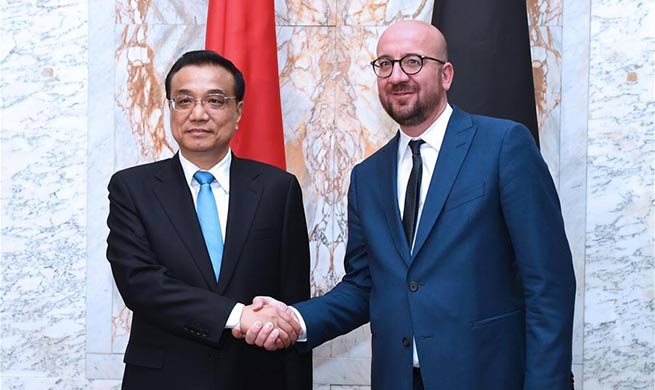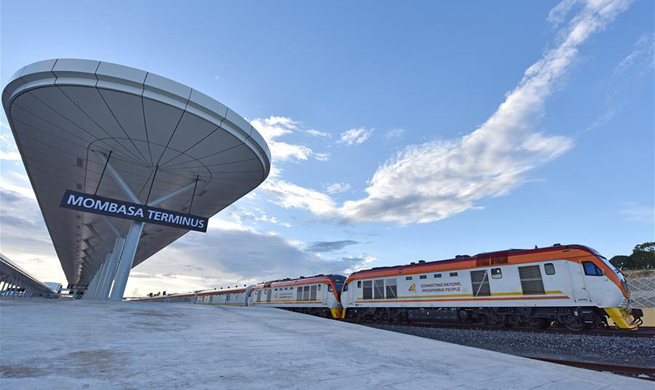
Photo taken on Sept. 29, 2013 shows a general view of the Waigaoqiao Bonded Area of theChina (Shanghai) Pilot Free Trade Zone in Shanghai, east China. TheChina (Shanghai) Pilot Free Trade Zone started operation on Sunday, launching a test bed for the Chinese leadership's drive of deepening market-oriented reforms and boosting economic vigor. (Xinhua/Chen Fei)
WASHINGTON, June 4 (Xinhua) -- World Bank on Sunday maintained its forecast for global growth in 2017 and 2018 unchanged at 2.7 percent and 2.9 percent, respectively, as manufacturing and trade are picking up and confidence is improving.
"A bright spot in the outlook is a recovery in trade growth to 4 percent (in 2017) after a post-financial crisis low of 2.5 percent last year," said the World Bank in its flagship Global Economic Prospects (GEP) report released on Sunday.
The recovery in trade growth in 2017 is supported by stronger demand from major advanced economies, increased trade flows to and from China, and a diminished drag from weak demand from commodity exporters, said the World Bank.
Stronger trade also reflected the improved outlook for global growth. According to the forecast, advanced economies are expected to grow 1.9 percent in 2017, accelerating from the 1.7 percent growth in 2016, said the World Bank in its flagship Global Economic Prospects (GEP) report released on Sunday.
However, it expected the advanced economic growth to slow to 1.8 percent in 2018 and 1.7 percent in 2019, in line with its forecasts in January.
In emerging market and developing economies, growth is expected to accelerate to 4.1 percent in 2017 from 3.5 percent in 2016. The growth is projected to pick up pace in 2018 and 2019, and will reach 4.5 percent and 4.7 percent respectively.
"After a prolonged slowdown, recent acceleration in activity in some of the largest emerging markets is a welcome development for growth in their regions and for the global economy," said Ayhan Kose, director for the GEP program at the World Bank.
Growth among the world's seven largest emerging market economies, namely China, Brazil, India, Indonesia, Mexico, Russia and Turkey, is expected to surpass its long-term average by 2018.
"Recovering activity in these economies should have significant positive effects for growth in other emerging and developing economies and globally," said the report.
World Bank expected Chinese economy to grow 6.5 percent this year and 6.3 percent in 2018 and 2019, in line with its forecast in January.
Fiscal support is expected to continue to offset monetary tightening, said the World Bank. It expected government policies will continue to support growth, contain financial risks, and encourage a rebalancing of the economy to more of a focus on consumption.
The U.S. economy is projected to grow 2.1 percent this year, 0.1 percentage point lower than the World Bank's forecast in January. However, it raised the forecast for U.S. growth in 2018, up 0.1 percentage point to 2.2 percent. The growth will again slow to 1.9 percent in 2019, as it moves closer to potential.
"The possibility of significant additional policy changes presents upside as well as downside risks to the U.S. growth forecast for 2018 and 2019," said the World Bank.
Tax cuts and infrastructure programs could lead to stronger-than-expected growth in the short term, but also to a more rapid increase in interest rates. Changes in trade policies could trigger retaliations from U.S. trading partners, damaging both the U.S. and its trading partners, said the World Bank.
Although global outlook is expected to improve this year, the risks to the global economy are still tilted to the downside, said the bank.
According to the report, increased trade protectionism could derail the trade growth momentum; elevated policy uncertainty could dampen confidence and investment; and the possibility of financial market disruptions still remained.
"For too long, we've seen low growth hold back progress in the fight against poverty, so it is encouraging to see signs that the global economy is gaining firmer footing," Jim Yong Kim, World Bank president, said in a statement on Sunday.
"With a fragile but real recovery now underway, countries should seize this moment to undertake institutional and market reforms that can attract private investment to help sustain growth in the long-term," said Kim.

















